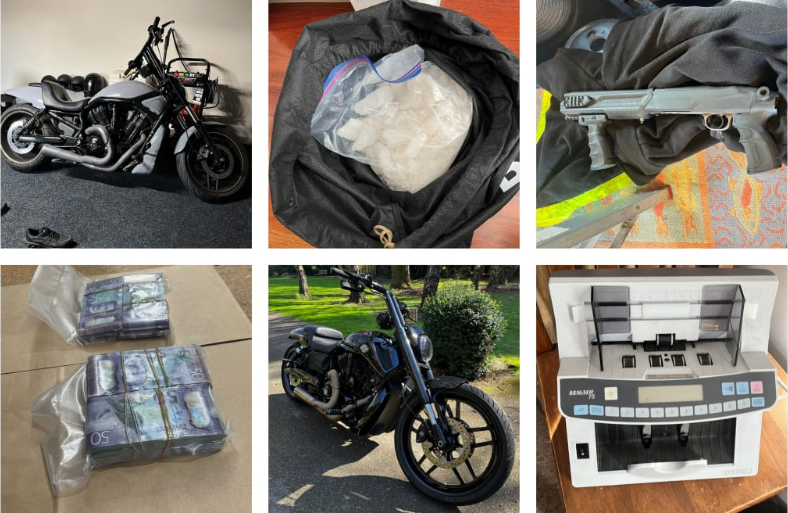
All but 11 of the 92 gang members are facing criminal charges, as a result of an investigation that began back in 2021.
The Comancheros are accused of carrying out a complex money-laundering operation, importing drugs, as well as providing military-style training for some members.
More than 200 kilograms of methamphetamine was seized, along with more than $9 million of assets and more than $1 million in cash.
'Nothing to do with current government'
Labour leader Chris Hipkins told Morning Report the police operation targeting the Comancheros began under the previous government and was a sign they had their priorities right.
"This was a three year investigation that's now come to fruition now, so clearly nothing to do with the current government at all. Something the police have been working on for three years, I think they've done a great job here."
Hipkins said he thought the government's proposal on gang patches went too far, but he wouldn't commit to changing them if elected in the future.
"I think the patch ban, that ship will have sailed by the time the next election rolls around.
"We'll have a look at that in the future, I'm not going to make commitment on that now, we'll see how that's ultimately working."
'Symbolic' but little impact on drug trade
Police laid a total of 137 charges against more than 40 of the gang's members and associates.
The announcement follows the arrest of every member of the Christchurch chapter last month.
Gang researcher and Canterbury University sociologist Jarrod Gilbert said the crackdown was significant.
"It will have a massive impact on that group specifically, I mean, it would not surprise me if it knocks it out of Christchurch... and it may well knock the stuffing out of it for quite some time," he said
Chris Wilkins, the head of Massey University's drug monitoring system, said the arrests sent a crucial message.
"I think it's an important symbolic response to the Comancheros that were particularly out there and boastful about what gang lifestyle was about and how lucrative it could be. So I think it's a really important, symbolic operation."
But Gilbert said it will have very little impact on the drug trade.
"When demand hasn't been affected, demand hasn't been impacted at all by this, unfortunately, that does mean that other suppliers will simply jump in to meet that demand.
"So the impact on the drug trade, not significant, but on that group in particular, and on ensuring that they don't gain undue advantage from organised crime, for example by gaining huge profits, which can be used to corrupt, it's incredibly important." he said.
Police said the gang hired someone from overseas for military-style training for some of its members.
Police Association president Chris Cahill said while he did not know what that would have involved, he had some suspicions.
"It could be things like counter surveillance, could be things like avoiding electronic surveillance, right down to you know, self-defence, those sorts of things.
"There's so many different uses could pertain to and it would be interesting to see what unfolds over the course of the prosecution and relation to that." he said.
Cahill said while the arrests were a good thing, there needed to be a focus on why young men were joining gangs in the first place.
"It's not so much police, it's Oranga Tamariki, education system. We've gotta make sure that these people feel that that part of society can contribute in other ways than joining gangs." he said.
The police Comanchero operation is winding up at a time the government is getting tough on gangs.
It is about to bring in a new law banning gang patches in public and has made two last-minute amendments.
One allows police to search members houses for insignia when a person has repeatedly broken the ban. The other, revealed on Tuesday night, ensures the law will cover patches and symbols in cars.
The changes will not go back to select committee for consultation.














